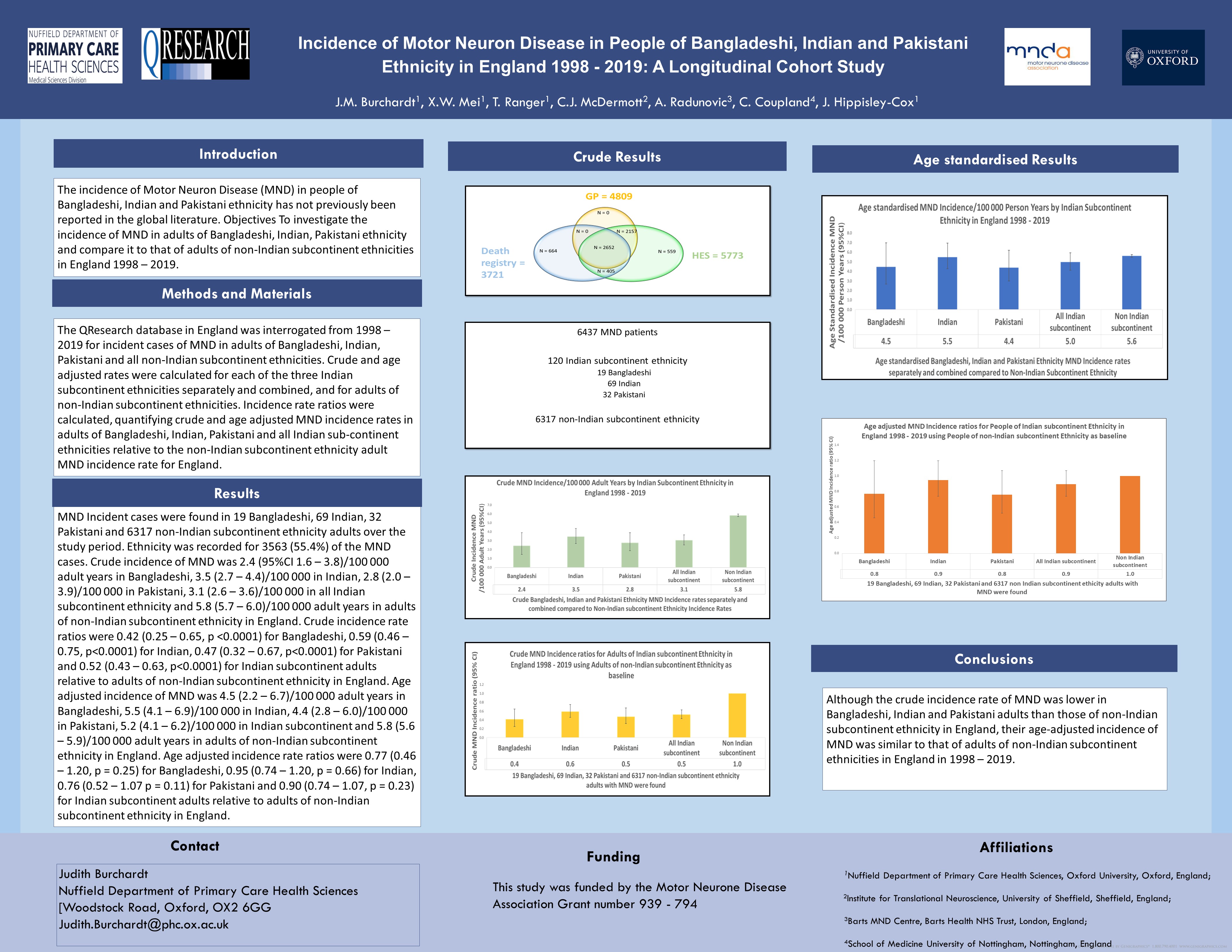Status
Completed
Title
Improving Early Recognition of Motor Neurone Disease
What were the objectives of the study?
The aim of this study is to identify and quantify patterns of ‘red flag’ symptoms associated with a diagnosis of Motor Neurone Disease (MND). The research will inform the evidence base for the subsequent development of tools in GP systems to improve the early recognition of MND.
MND is believed to affect approximately 5000 people in the UK at any one time. Most people with MND are aged between 50 and 70. It tends to affect twice as many men as women. MND causes progressive muscular weakness that may first present as isolated and unexplained symptoms. It is difficult to diagnose since it is both a rare disease and the symptoms (such as clumsiness, weakness or slurred speech) may be due to other conditions. Patients may delay consulting their GP and the GP may not consider MND as a potential cause of the symptoms resulting in delays in diagnosis and hence delays in starting treatments.
Recent NICE guidance (NG42) prioritises the recommendation that there are “robust protocols and pathways to inform health professionals about MND and how it may present”. All UK general practices use electronic health record systems to record clinical information and these computer systems have advanced features which are used to help identify patients at risk of medical conditions or to prompt GPs to consider diagnoses such as cancer. In theory, it would be possible to build tools into the clinical systems which can be used to help identify patients with possible MND earlier. However, before this can be done, research is needed to identify which, of the many symptoms of MND, are the most important ones which are likely to be recorded on GP systems and which symptoms (or combination of symptoms) increase the likelihood that a patient has MND. The important thing here is to ensure that any potential tool has an appropriate balance between sensitivity and specificity, so that patients with MND are identified without too many alerts being generated for patients who do not have the disease.
How was the research done?
In order to do this we will use a large medical research database called QResearch which has anonymised information on patients from 1500 general practices in England. This database will allow us to identify people with motor neurone disease and match them to a control group of people of the same age and sex who don’t have motor neurone disease. We can then look at their medical records for the time period before their diagnosis to identify which of the possible red flag symptoms for MND occurred more frequently in people with MND than controls. This will then help us determine which combinations of symptoms are the most useful for helping GPs to make earlier diagnoses of MND.
Chief Investigator
Julia Hippisley-Cox
Lead Applicant Organisation Name
Sponsor
University of Oxford
Location of research
University of Oxford
Date on which research approved
01-Feb-2019
Project reference ID
OX1
Generic ethics approval reference
18/EM/0400
Are all data accessed are in anonymised form?
Yes
Brief summary of the dataset to be released (including any sensitive data)
This is a case control study comparing cases with MND with controls who do not have MND. The information to be extracted includes age, sex, red flag symptoms which might indicate a diagnosis of MND. We will also identify potential risk factors from a literature review which may be associated with an increased or decreased risk. This may include ethnicity, social deprivation, body mass index, family history, lifestyle information (e.g. smoking, alcohol), clinical values (such as HDL/LDL cholesterol values), other morbidities such as coronary heart disease, stroke, dementia, diabetes, psychiatric conditions.
Linked data for mortality data and hospital episode statistics will be used to identify cases of MND
What were the main findings?
By searching three linked datasets - GP and Hospital records and Death Certificates - we found a much higher than expected incidence of Motor Neuron Disease (MND) in England. We identified 6437 patients with a code for MND giving an incidence between 5.5 and 5.9 / 100 000 adults per year after adjusting for age. Similar studies in the UK using a single dataset have found 2 - 2.9 / 100 000 adults develop MND each year. The patients we found had a median age of 72 years at diagnosis, 5 - 10 years older than those in previous similar studies. This was the first study looking at incidence of MND in Bangladeshi, Indian and Pakistani people in the UK and their incidence was found to be similar to that of White people. Incidence was lower in Chinese and Black African people. It is possible that elderly people, possibly already disabled by other illnesses, are diagnosed with MND but not recorded on specialist neurological databases.
Implications and Impact
The aim of this study is to identify and quantify combinations of ‘red flag’ symptoms associated with a diagnosis of MND. The research will inform the evidence base for the subsequent development of tools in GP systems (such as alerts, templates and protocol) to improve the early recognition of MND.
Funding Source
Motor Neurone Disease Association
Public Benefit Statement
Research Team
Julia Hippisley-Cox, University of Oxford
Carol Coupland, University of Nottingham
Judith Burchardt, University of Oxford
Xue W Mei, University of Oxford
Tom Ranger, University of Oxford
Christopher J McDermott, University of Sheffield
Aleksandar Radunovic, Barts
Protocol
A copy of the protocol can be downloaded here.
Publications
-
Analysis of incidence of motor neuron disease in England 1998–2019: use of three linked datasets
Authors: Judith M. Burchardt, Xue W. Mei, Tom Ranger, Christopher J. McDermott, Aleksandar Radunovic, Carol Coupland & Julia Hippisley-Cox
Ref:
https://www.tandfonline.com/doi/full/10.1080/21678421.2021.2016837 -
Identifying key signs of motor neurone disease in primary care: a nested case–control study using the QResearch database
Authors: Xue W Mei, Judith Burchardt, Tom A Ranger, Christopher J McDermott, Aleksandar Radunovic, Carol Coupland, Julia Hippisley-Cox
Ref:
https://bmjopen.bmj.com/content/12/6/e058383

Access Type
Trusted Research Environment (TRE)

